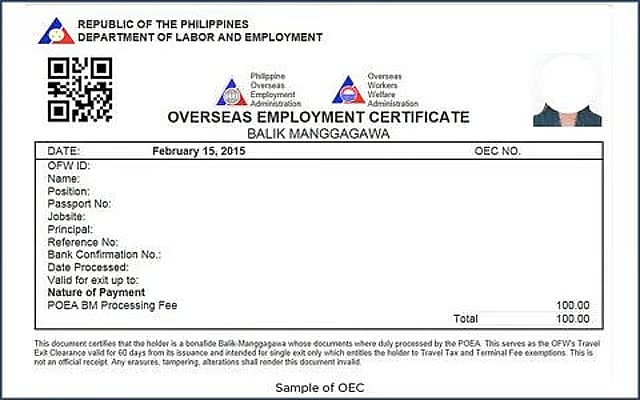Viral airport video prompts Bureau of Immigration to clarify OEC requirement for OFWs
The Overseas Employment Certificate provides a wide range of benefits for OFWs

Dubai: The Bureau of Immigration (BI) has issued a public clarification regarding the Overseas Employment Certificate (OEC), emphasizing that the document is a requirement set by the Department of Migrant Workers (DMW). The BI's role is to implement this rule for all overseas Filipino workers (OFWs) departing the Philippines for employment abroad.
This clarification from the BI follows a recent viral video showing a mother who was unable to board her flight, an incident that has brought public attention to the OEC requirement. The bureau explained that it is simply enforcing the DMW's policy, which is designed to ensure the proper documentation and protection of OFWs.
Also Read
From housemaid to hero: How a Filipina OFW in Dubai raised her daughter alone and built a life from sacrificeKabayan: Don’t wait — register early for a smooth-sailing OECWhy every Filipino should visit India (and vice versa): A journey of colour, culture & culinary delightsIndia and Philippines set for tourism boom with new flights and growing tiesUnder Republic Act No. 11641, also known as the Department of Migrant Workers Act, the DMW is legally mandated to issue this exit clearance. The OEC serves as official proof that a worker has been properly vetted by the government and is leaving the country through legal channels.
'Filipinos traveling abroad on employment visas are required to present a valid OEC, while those on dependent visas are not required to secure the said document,' said BI Commissioner Joel Anthony Viado. He added that immigration officers understand the challenges faced by migrant workers and that the OEC is a standard part of the process to ensure the protection and welfare of OFWs.
To make the process easier for OFWs, Commissioner Viado highlighted the new dedicated OFW wing at Ninoy Aquino International Airport (NAIA) Terminal 3. The BI's final piece of advice to departing workers is to secure their OEC through official channels well in advance of their flight to avoid any delays or issues at the airport.
OEC: What is it?
The Overseas Employment Certificate (OEC), also known as an 'exit clearance' or 'pass,' is a crucial document required by the Philippine government for all Overseas Filipino Workers (OFWs) leaving the country for employment. This process is essential for the welfare of OFWs, as it not only provides them with protection but also grants them exemptions from travel tax and airport terminal fees.
The OEC serves as proof of legal employment abroad and is a mandatory requirement for exiting the Philippines for work purposes. It certifies the regularity of recruitment and documentation, and acts as proof of the individual being a bona-fide OFW. Without this document, a departing OFW will be barred from leaving the country by immigration authorities at Philippine airports.
Overseas Employment Certificate benefits
OEC provides a wide range of benefits for OFWs, covering travel, legal protection, and access to government services.
Travel-related privileges: OEC holders enjoy significant privileges at Philippine airports. They are exempted from paying the airport terminal fee as well as the Philippine travel tax. Furthermore, international airports in the Philippines provide priority lanes for OFWs for both departure and arrival, making the process smoother and faster.
Legal and employment protection: The OEC serves as an official document that confirms an OFW is properly documented and legally employed abroad. This status grants them access to government assistance from embassies, consulates, and Philippine Overseas Labor Offices (POLO) in cases of labor disputes, emergencies, or the need for repatriation.
Government Benefits and Services: Possession of a valid OEC allows OFWs to renew or maintain their membership with the Overseas Workers Welfare Administration (OWWA). This membership provides access to a variety of benefits, including insurance and health coverage, education and livelihood programs, and support for repatriation and reintegration. Additionally, OEC holders can participate in skills training, job matching, and reintegration programs offered by the Department of Migrant Workers (DMW) and the Department of Labor and Employment (DOLE).
Banking and investment perks: OFWs with a valid OEC are often eligible for special financial programs and investment schemes. Many banks and government institutions, such as the Social Security System (SSS), Pag-IBIG Fund, and Land Bank of the Philippines, offer low-interest loans and exclusive investment products designed specifically for OFWs with proper documentation.
Sign up for the Daily Briefing
Get the latest news and updates straight to your inbox
Network Links
GN StoreDownload our app
© Al Nisr Publishing LLC 2026. All rights reserved.
